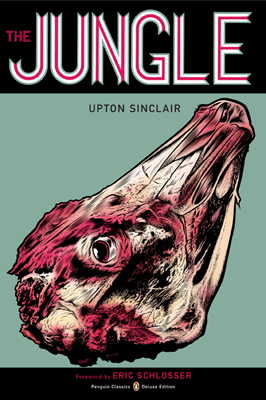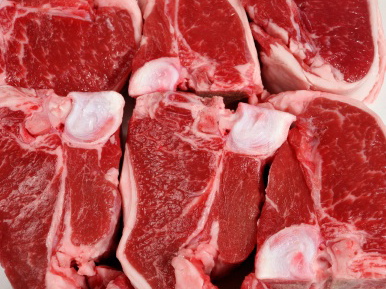
reference-image, l
(article, Upton Sinclair)
[%pageBreakSettings nobreak=true] h3. From Chapter 3 p(blue). Editor's note: In this excerpt from Sinclair's muckraking classic, a Lithuanian shows some new arrivals from the old country around the Chicago stockyards. They passed down the busy street that led to the yards. It was still early morning, and everything was at its high tide of activity. A steady stream of employees was pouring through the gate. In the distance there was heard again the lowing of the cattle, a sound as of a far-off ocean calling. They crossed the railroad tracks, and then on each side of the street were the pens full of cattle; they would have stopped to look, but Jokubas hurried them on, to where there was a stairway and a raised gallery, from which everything could be seen. Here they stood, staring, breathless with wonder. There is over a square mile of space in the yards, and more than half of it is occupied by cattle pens; north and south as far as the eye can reach there stretches a sea of pens. And they were all filled — so many cattle no one had ever dreamed existed in the world. Red cattle, black, white, and yellow cattle; old cattle and young cattle; great bellowing bulls and little calves not an hour born; meek-eyed milch cows and fierce, long-horned Texas steers. [[block(sidebar). h1. About the book and author A socialist activist who called for reform with his many articles, essays, and books, the American author Upton Sinclair (1878-1968) is most famous for his 1906 novel The Jungle, which exposed both the degradation of immigrant life and the filth and cruelty of slaughterhouses in contemporary Chicago. Like Harriet Beecher Stowe's Uncle Tom's Cabin, The Jungle came along at the right time; popular awareness of the horrific conditions prevalent in the American food system had been increasing, but The Jungle catalyzed public consciousness. That same year, the federal government quickly passed the Pure Food and Drug Act, the nation's first attempt at regulation of food production. Modern successors to the Sinclair mantle include Eric Schlosser, Peter Singer, and Jim Mason. ]] The sound of them here was as of all the barnyards of the universe; and as for counting them — it would have taken all day simply to count the pens. Here and there about the alleys galloped men upon horseback, booted, and carrying long whips; they were very busy, calling to each other, and to those who were driving the cattle. They were drovers and stock raisers, who had come from far states, and brokers and commission merchants, and buyers for all the big packing houses. Here and there they would stop to inspect a bunch of cattle, and there would be a parley, brief and businesslike. The buyer would nod or drop his whip, and that would mean a bargain; and he would note it in his little book, along with hundreds of others he had made that morning. [%image featurette-image float=right width=200 caption="Do you know where your meat comes from?" credit="Photo: iStockphoto/PaulCowan"] Then Jokubas pointed out the place where the cattle were driven to be weighed, upon a great scale that would weigh a hundred thousand pounds at once and record it automatically. It was near to the east entrance that they stood, and all along this east side of the yards ran the railroad tracks, into which the cars were run, loaded with cattle. All night long this had been going on, and now the pens were full; by tonight they would all be empty, and the same thing would be done again. “And what will become of all these creatures?” cried Teta Elzbieta. “By tonight,” Jokubas answered, “they will all be killed and cut up; and over there on the other side of the packing houses are more railroad tracks, where the cars come to take them away.” There were two hundred and fifty miles of track within the yards, their guide went on to tell them. They brought about ten thousand head of cattle every day, and as many hogs, and half as many sheep — which meant some eight or ten million live creatures turned into food every year. One stood and watched, and little by little caught the drift of the tide, as it set in the direction of the packing houses. There were groups of cattle being driven to the chutes, which were roadways about fifteen feet wide, raised high above the pens. In these chutes the stream of animals was continuous; it was quite uncanny to watch them, pressing on to their fate, all unsuspicious a very river of death. Our friends were not poetical, and the sight suggested to them no metaphors of human destiny; they thought only of the wonderful efficiency of it all. The chutes into which the hogs went climbed high up — to the very top of the distant buildings; and Jokubas explained that the hogs went up by the power of their own legs, and then their weight carried them back through all the processes necessary to make them into pork. “They don’t waste anything here,” said the guide, and then he laughed and added a witticism, which he was pleased that his unsophisticated friends should take to be his own: “They use everything about the hog except the squeal.” In front of Brown’s General Office building there grows a tiny plot of grass, and this, you may learn, is the only bit of green thing in Packingtown; likewise this jest about the hog and his squeal, the stock in trade of all the guides, is the one gleam of humor that you will find there.

reference-image, l

feature-image, l

promo-image, l

featurette-image, l